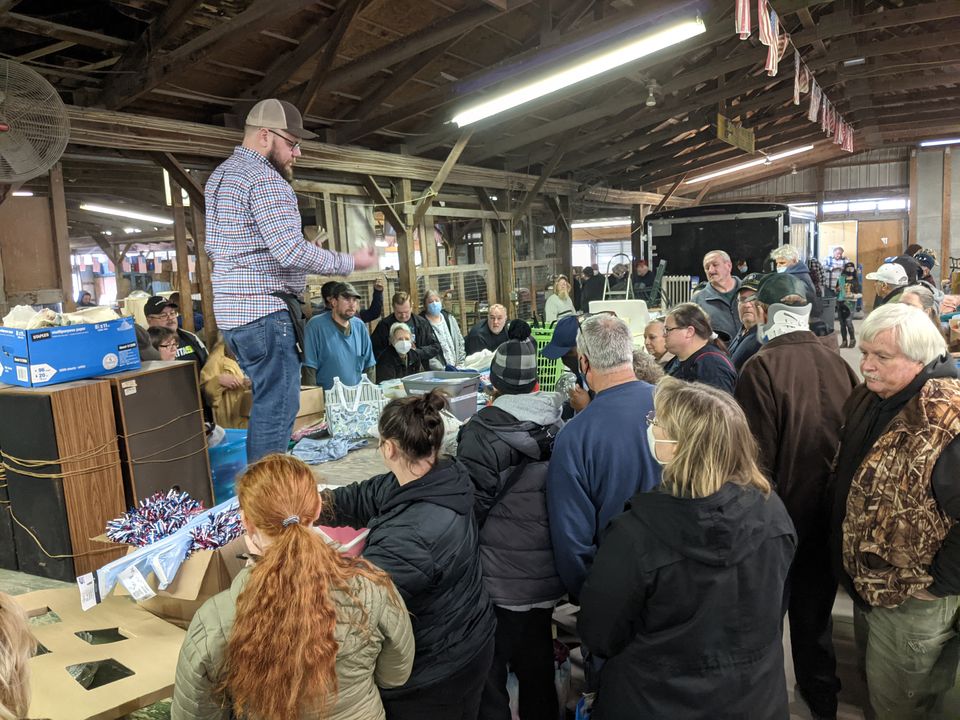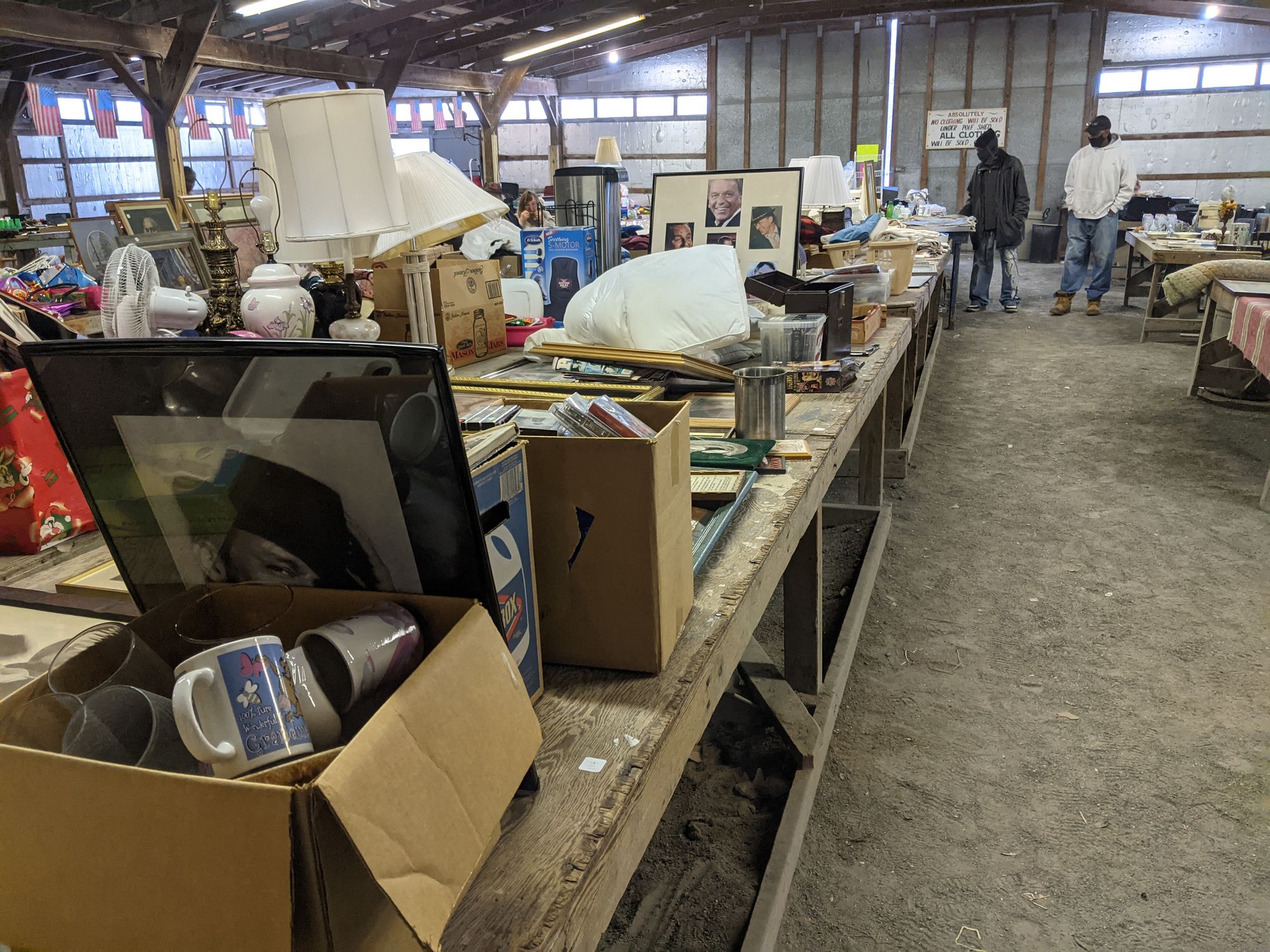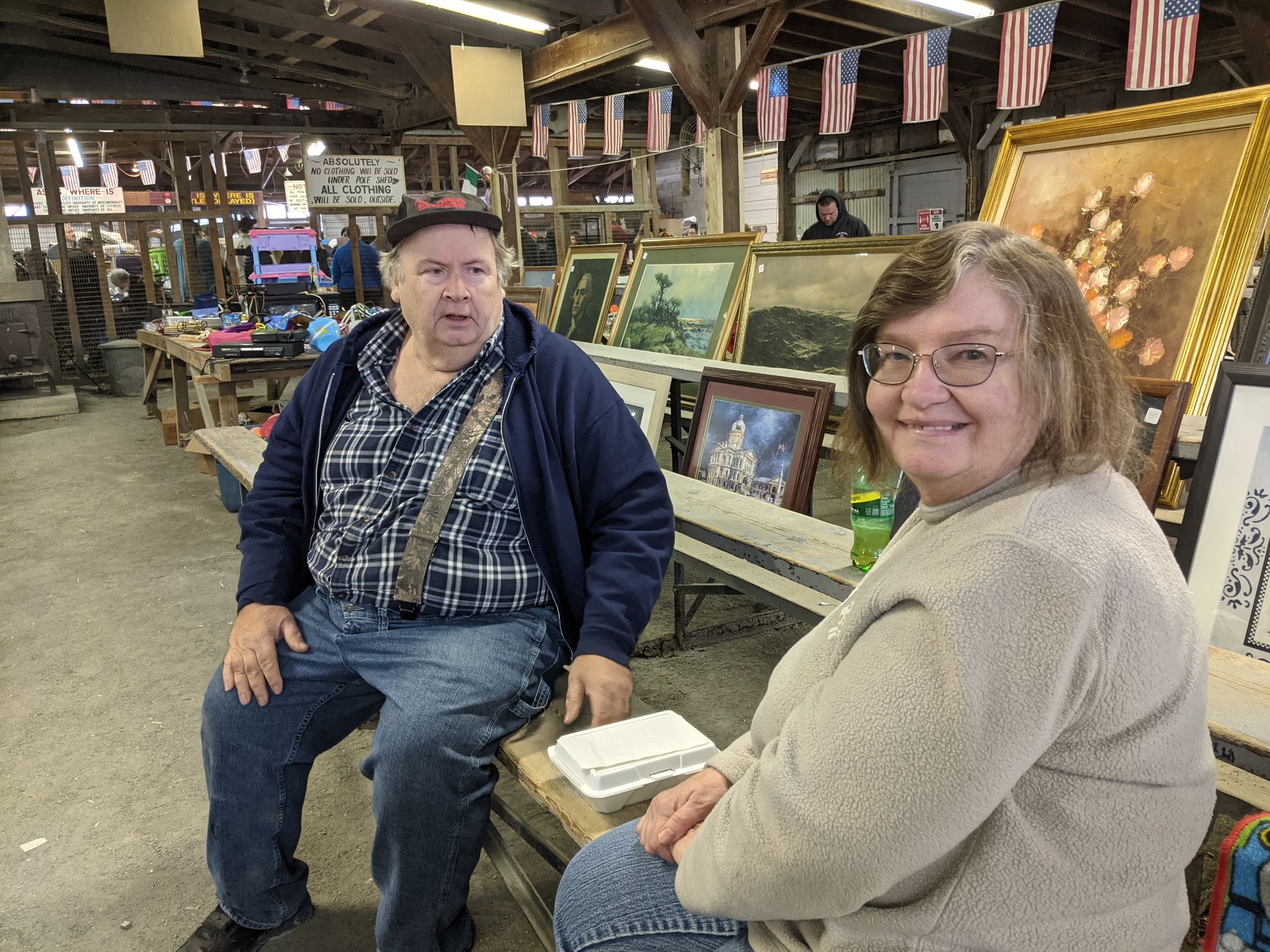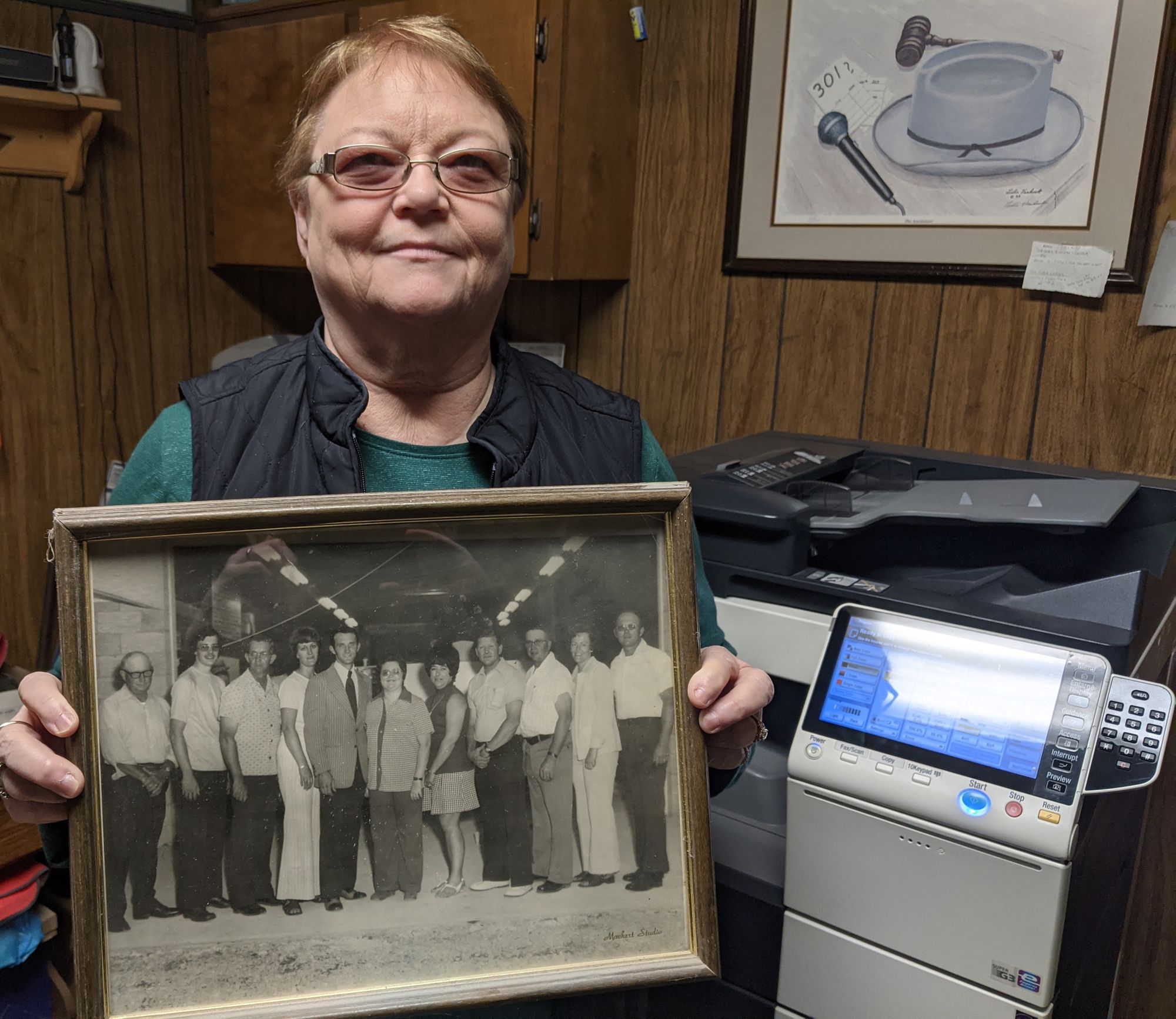A Sussex landmark, Wilson's Auction is still rolling after 50 years

If there were a bus tour of Sussex County cultural sites, Wilson’s Auction in Lincoln would surely be a stop.
People have been finding deals – and unloading their old stuff – at the large building just off Route 113 for just over 50 years. The local institution marked half a century on March 9, 2021.
The family enterprise was started by auctioneer Dave Wilson and his wife Carolyn, who still run it. Dave Wilson is a well-known figure in the area and a state senator for District 18, which covers most of northern Sussex County. He said COVID kept the company from holding an anniversary celebration last year.
“I’d like to still do it … you know, 50 years, I won’t be here for the next 50 so I’d better get started.”
Visitors from years ago would likely feel at home walking in the doors today, although they’d probably be taken aback by the lack of cigarette smoke. It’s a bit of a time capsule – the crushed shell parking lot outside, the wood stoves throughout radiating heat on cold days, the auctioneers cajoling people to bid as they have for decades.
The Wilson’s complex includes a large, sprawling pole building – or rather, multiple pole buildings put together – that has gotten larger over the years and hosts auto auctions on Tuesdays and a weekly consignment auction on Saturdays.
“If you can’t find it at Wilson’s Auction, it don’t exist,” Bob Webster said at a recent auction. Webster is a Harrington resident who has been going to the auction since 1972, practically from the beginning.
Stop in on a Saturday and you’ll be able to stroll the dirt floors down long rows of wooden tables loaded with, as Webster said, just about everything. Glassware. Furniture. Baskets. Hedge trimmers. Old power tools. Sleds. Boxes of nails, screws and bolts. A tackle box with fishing gear in it. Vintage dolls. Clothes. Books about everything: “Piano for Dummies”; “The How-To-Handbook for Jewish Living”; “Jeep Cherokee Haynes Service and Repair Manual 1995-96.” VHS tapes of “The Godfather Part II” or “Three Men and a Baby.” Large print photos of celebrities from the 60s. You never know what you’ll find, but there will probably be something unexpected.

Want to buy any of it? Find the crowd gathered around the auctioneer moving down one of the tables, bantering with the buyers, accompanied by an assistant with a clipboard to record sales. On a recent Saturday, the auctioneer paused to ask people in the crowd what they particularly were interested in.
“Anybody see anything you can’t live without down here?” he asked.
He did his best to squeeze the best price out of a set of nutcrackers, then gave a wry laugh when they brought only $3.
Finally, the crowd’s interest apparently exhausted, he said, “Now I’m selling everything left on this table and this table.”
George Moore, of Salisbury, who was at the auction with his wife Vicki, is a regular and knew exactly how long he’s been coming: eight years in April.
“We used to ride by here all the time,” he said, but they never stopped. Once they did, though, he was hooked.
“It’s almost like a bar in a way,” he said, a chance to see friends and meet new people.
It’s also a place to pick up deals. He keeps an eye out for power tools. A lot of times they don’t work, he said, but he was philosophical about it.
“If it’s already broke, I can’t break it any more,” he said, and more importantly, he knows how to fix them.

A lifetime at auctions
The fast-talking auction chant is a staple of rural America, and Dave Wilson was immersed in it at an early age growing up on the family farm in Lincoln. In fact, his father bought that farm in 1955 at an auction.
“My dad always took me to the auctions,” he said. “You know, we went to farm sales and public sales, and Spence’s (in Dover) and Carroll’s (livestock auction near Felton).
Spence’s is where he got his first taste of auctioneering. He started working there in 1961, doing work like helping tag produce. Then one day, Henry Evans, one of the auctioneers who was selling watermelons, came up to him.
“He said, ‘Son, I gotta go to the men’s room,’” Wilson said. “He says, ‘Get up here and sell a lot.’”
Wilson was only 11 years old, but “you couldn’t make too many mistakes back in those days, quarter, 35 and 50 cents for watermelons, you know.”
It was enough to impress Ralph Spence, who a couple weeks later put him to selling more watermelons and cantaloupes, for which task Wilson recalls earning $5.
“That was big money,” he said.
He also worked at Carroll’s sale, starting out driving a truck hauling livestock, moving on to selling poultry, eggs and rabbits, and working his way up to selling horses.
In 1966, at age 16, he did his first public sale for an estate in Georgetown.
“I had to get a business license, and I wasn’t old enough to get it,” Wilson said. “My mother had to sign for me.”
A dream come to fruition
Carolyn Wilson said she and Dave met in 1969 and married in 1970. Although Dave was working as an auctioneer, he had always wanted to start his own auction and in 1971 they opened up selling every other Saturday at the Lincoln Community Center.
“We always thought there’d never be enough stuff to have a running auction, people would run out of stuff, but they haven’t,” Carolyn said with a laugh.

In 1975, they moved the auction to its current location and haven’t looked back, growing the business into one that brings in millions of dollars a year. The business includes not only the weekly auctions on site but sales of real estate, equipment, Delaware’s weirdly popular low-digit tags and more.
Twice a year, on the third Saturday in March and the third Saturday in September, they do a mega equipment sale at the fairgrounds in Harrington where there’s more space.
They’ve been joined by auctioneer K. Wade Wilson (no relation), who started working at Wilson’s at age 9 and now serves in a number of roles as a “backbone of the company,” Dave Wilson said. They also employ a number of other auctioneers.
Wilson’s Auction also helps out at a number of benefit auctions every year, including for FFA and 4-H at the state fair, senior centers like CHEER, fire departments and the Ministry of Caring in Wilmington. Each year Dave Wilson can also be found on stage at the Georgetown Fire Company Oyster Eat selling off the traditional oyster knife, which goes for thousands of dollars.

“I always felt in the years I’ve been in business that it’s a good way to support your community,” Dave Wilson said.
The art of auctioneering
There’s more to auctioneering than talking fast, although that distinctive singsong cadence is what most people think of.
That does take a fair amount of work, of course, which Dave Wilson and K. Wade Wilson have honed over the years.
Dave Wilson practiced by pretending to sell animals on his father’s farm.
“I sold so many animals from my dad, he’d’ve had nothing left to sell when I finished.”
“I’ve practiced on the road, in the shower,” K. Wade Wilson said. “... I still catch myself calling bids at strange times. My wife will be like, ‘What are you doing?’”
But, “It’s more than just calling numbers,” Dave Wilson said.

There are auctioneer schools that teach people the basics like bid calling, but Wilson is a big proponent of hands-on learning, developing the art of getting the most out of a sale.
To do that job, auctioneers rely on connection with the crowd and building momentum for an item to get the best price, and they have to have a good sense of what prices they can get. If they start out way too high and then flounder around and end up much lower, they lose the confidence of the buyers.
“You gotta have enough knowledge to know that, if you haven’t got the money, what can I say positive? What can I do to build this atmosphere to move the bids up?” Wilson said.
Some of that comes from banter with the crowd. He recalled selling horses in Ohio, and the auctioneer there had a knack for taking a horse that was stuck at a low price and bringing it up.
“He’d say, ‘Come on, you know what these Wilson horses are, he brings them all the way out here, drives 550 miles and you guys are trying to steal ‘em, come on, wake up here.’”
“We never do a farm equipment sale that we don’t take and research and know what we’re selling. And we’re familiar with the market, we look online, we take and use our research,” Wilson said. “We’ve got books and manuals, we go through that stuff. It’s not just a deal that we show up that day and start calling numbers.”
It’s about building excitement, Carolyn Wilson said, an element she feels is missing from online auctions.
As longtime Wilson’s Auction aficionado Bob Webster described it, people get caught up in the heat of the moment and they pay more than they thought they would.
Not ready to quit
They started young, so despite more than 50 years in business, Dave and Carolyn Wilson aren’t retiring yet. They have confidence that K. Wade Wilson can carry on the operation someday, but Carolyn still works in the office as she always has, and Dave, who is in his early 70s, still does auctioneering in addition to his work in the state Senate.
“People are always surprised when I tell them Dave’s age,” K. Wade Wilson said. “They think ‘Well, I thought he was older than that. Seems like he’s been around forever.’”
As far as Wilson’s Auction goes, “We’re not done growing,” Dave Wilson said.
We depend on readers like you to support the Delaware Independent. If you haven't already, would you consider joining the team with a paid subscription?
More stories:



